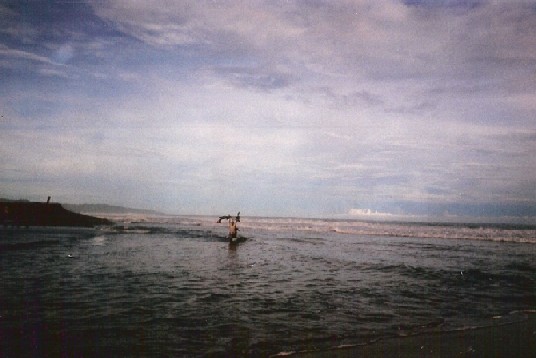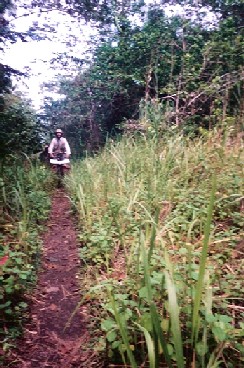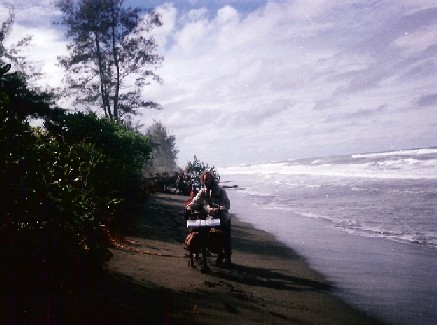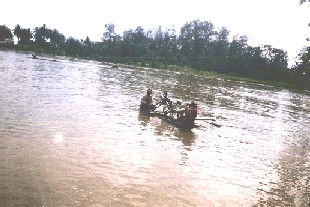The Long Struggle to Port Moresby- The surprises of Papua New Guinea
Thursday, February 23rd, 2006To return to my homepage please go to www.cyclinghomefromsiberia.com
Current Location: Port Moresby (Capital City of Papua New Guinea… voted in
the Economist 2005 as the worst city in the whole world to come on a
business trip!)
Number of days of toil and sweat it took me to cover the final 100 miles to
Port Moresby: 12
“Present fears are less than horrible imaginings” – William Shakespeare
“Nothing will ever be attempted if all possible objections must first be
overcome” – Samuel Johnson
“Expect the unexpected… I mean it”. This was probably the best possible
advice I could have been given prior to crossing Papua New Guinea (PNG) with
my bicycle – from its Indonesian border in the north west to the capital
city in the south east. I thought this trip would take me 3-4 weeks… it
has ended up taking over 7. Other emails I received in my approach to this
little known frontier land included:
“I should warn you that travel in PNG can be quite dangerous – I have been
held at gunpoint and robbed 16 times, and have been caught in crossfire from
warring tribes using M16s and the like… I dn’t mean to be negative but
I’m sure you would want to make informed decisions on where you travel.”
“To quote the chap from “The Castle”: “He’s dreaming!” There is not a hope
of him cycling the Kokoda. The thing is vertical for 90% the rest is in a
bog with far too many tree roots in the way… I reckon he is mad and would
suggest him to take his bike to Oz and have done with it…”
“he is ******* mad. … but then again mad dogs and Englishmen (where is he
from?). please pass on my best regards if you see him before he heads off and
attempts this and maybe take the contact details of his family back home in
case he never arrives here in POM…”
“I worked in the ‘security’ business over there….. and it is the wild
west, with no back-up. “
Needless to say, this well intended advice made me feel rather daunted and
hesitant, so as I entered PNG I had to also remind myself of the more
positive encouragement I was also given… but I was still very frightened.
So what is this boundlessly unique and exotic country like? Six months ago,
all I knew was that the people spoke lots of different languages (in fact,
around about 700 languages spoken by less than 10 million people), there is
lots of gold (and all sorts of other minerals, which is being exploited by
various foreign multinationals) and that there are lots of rainforests and
mountains (I was definitely right about this) I have also since discovered
that, like many other former colonies (but perhaps even more so), it is
struggling to transform itself from the traditional ways of tribal villages
to the modern world of governments, laws, guns, jobs, money and roads.
It is no wonder that this change is proving painful. Just 100 years ago a
large chunk of PNG’s population had had no contact with the outside world
and still used stone-aged tools. The people were loyal to their own tribes
and customs – but often hostile to the neighbouring village. Before there
was no money – and even today it is perfectly possible to live a healthy
village life without it. As the saying goes: “if you stick something in the
ground here, it grows”. Thus there is an abundance of locally growing
vegetables and fruit. The coastal roads are lined with coconut trees and if
I thirsted as I pedaled, I could merely mention this to a friendly looking
passerby, and he would scamper up a tree and return moments later with an
armful of coconuts with which to fill my water bottles – before announcing
with a grin that he was the local pastor (I’ve never seen an English vicar
climb a tree like that!). Other things like herbal medicines are available
too – the plant sap which was poured in my infected tropical ear seemed to
do just as much good as the painful penicillin injections in my buttocks!
Perhaps it is because the land provides such bounty, and because nothing
needs to be stored for winter (there is no winter) and because everything
rots so quickly, that the culture is not geared to forward thinking and to
quickly producing a successful economy? In the cities however, people have
less space to grow their own food, and discontent grows. Politicians often
slide into blatant nepotism. AIDS is also becoming a serious issue.

Through the sea…
Anyway, one of the results of a country being in such a state of fragmented
discombobulation is that many of the bored, frustrated young men have turned
to gang crime – deadly characters which are known in these parts as
“rascals”. During my first weeks in PNG I was again and again warned of the
rascal threat, and in the middle of many a night in some hidden forest
village, I would wake up with horrible imaginings of being ambushed, while
thinking to myself: “what an earth am I doing here?”. My only consciously
close encounter with rascals came as I bumped through the potholes of a
string of villages along the “main road” on the north coast. Whenever I
spotted groups of local youths who fitted my imagined picture of rascals I
would usually reply to their cheers and yells that I should stop, by waving,
smiling and shouting “good afternoon” in my friendliest possible way – and
by not stopping but rather zooming on and out of their lives. On one
occasion as I turned to wave and smile to a particularly menacing posse, I
managed to crash my bicycle into the ditch. In an instant they were up on
their feet and sprinting towards me. I saw them just meters away as I
wrenched myself and bike back onto the road and took off as fast as I
could… I only just escaped into the distance, leaving a trail of dust
behind me. (Of course, I have no real idea if their intent was to harm me,
or just to come and have a chat… but such was my fearful state of mind at
that point).

Bush track…
The rascal menace aside, the terrain, climate and roadlessness of PNG were a
challenge in themselves… enough to make this the hardest adventure I have
ever done alone (Siberia in winter was harder, but I was with Al during
that). The ride through PNG began with a timber merchant’s road through the
rainforest… within half a day I was panicked by the jungle that enveloped
me on all sides. It hummed and flapped and sank deeply and darkly out of
sight – I felt it could consume me and no-one would ever know. To make
matters worse there were periodic junctions in the road where I didn’t know
where to turn, and there were no more villages to ask the way. Fortunately,
having run out of water, I eventually found a loggers camp where a couple of
the local lads agreed to walk with me (the muddy road was often unrideable
anyway) for two days to get back to the coast. Once there, we followed the
beach road… which essentially is not a road, but a beach. Here, I pushed
and waded and sweated my way past the postcard perfect breakers and sands.
Some days I had to hitch dugout canoes across rivers, other days to walk up
to my armpits in saltwater, the bike lifted high over my shoulders. I spent
my nights in village huts, eating cooked bananas and freshly caught fish and
wild pig. One night I spent floating down “the Mighty Sepic River” in a
motor boat I hired to get me past the crocodile infested Mangrove swamps.
Finally I was riding into Lae, the second city. It was on this road that I
had been warned that I would most likely be “rascalled”, so I was glad
indeed when a variety of local guys with bicycles offered to escort me … I
felt a bit like Forest Gump – cycling down the open road with my silly
beard, accompanied by a friendly throng fellow riders to protect me!

Along the beach…

Open road
After a ferry ride along a 200 km stretch of roadless coast I attempted my
final challenge of PNG: the Kokoda Trail. This is essentially a bush track
through the Owen Stanley Mountains which is one of the only land links
between the north coast and the Capital. It achieved great fame and
significance in World War II as the Japanese plundered their way south
towards Australia. In the end, just a handful of inexperienced, young Ozzy
recruits had to defend the trail against the vastly outnumbering Japanese
force. It must be said that they were heroes to stop the Japanese passing.
The trail itself is now a popular trekking route with tourists (one of the
few successful tourist endeavours in the country), though it is famously
grueling with nine huge ascents and descents through the high jungled ridges.
I was initially very uncertain as to whether it was plausible to carry or
push my bike over it (especially as this was the rainy season when tourists
didn’t walk the trail), but thanks to the enthusiastic advice and
encouragement of the tour company Kokoda Trekking Ltd (see
www.kokodatrail.com.au for details of their excellent tours) I decided to
give it a go. On my first attempt with a local guide we got about a third of
the way before we were forced to turn back by a ravenous swollen river which
had destroyed all the tree bridges, and which admitted no passing. I felt
very disappointed and worn out and was on the verge of giving up…but
thankfully, another eager, local guide, Tom Hango, was up for the challenge
and encouraged me to make a second attempt. This time the rivers were lower
and the sun had his hat on as we climbed and we stumbled through the valleys
and mountains and villages where a bicycle had never before been seen.
Swamps, fallen trees and 2000m high ridges would present daily challenges,
but with Tom carrying my heavy pack and me struggling to maintain my footing
with a bike hanging off my shoulder we made steady progress. Each night we
camped next to friendly streams or villages perched amidst the great
mountains… and then eventually, after seven long days, we crashed out of the
forest and wearily onto the firm surface of a real road. I cycled with
relief the final 50 km ride into the Port Moresby -we had made it!

Carrying my bike over the Kokoda

The swollen river
So I am pleased to say that have had a predominantly positive experience of
this country, with all its uniqueness, kindness, adventure and risk. I
cannot say how big the risk was that I took coming here alone and on a
bicycle… I think it is a sad trait of human opinion forming that the
behaviour of the few will always shape the reputation of the masses… thus
I think that PNG’s dangerous reputation is based on just a small proportion
of the population. The people I actually met took great care of me, without
exception. If you stay in close contact with the local population,
travelling fast and in daylight, the risks are greatly reduced… and in
fact, I believe that if we pray for protection there is also somebody who
looks after us. If I was not a Christian I doubt I would have had the guts
to come through PNG. It is also important to realise that everything in life
is a risk, and we never know how many near misses we have in life… and as
a friend recently wrote to me (who had in fact quit his well paid management
consultancy job in London in order to dig up anti-personnel mines for a
charity in the Sudan)… “it’s a bit scary if you think about it too much,
but like everything in life you need to play the probabilities a little –
otherwise we would sit in a padded room all day, eating sterilized food and
die at 120 of old age with nothing to show for it!”
Now as my visa ticks quietly away, I look out of the window of this
apartment at the lazy sea stretching south to a dark and empty horizon, but
which (according to my map) eventually reaches Australia. It is there where
I hope to go… all I need to do now is find something that floats that will
take me there.
As always, I really appreciate your emails, prayers, and generous donations
to Viva Network and their tireless work with children at risk around the
world (please go to www.justgiving.com/cyclinghomefromsiberia if you would
like to support them).
Happy belated 2006 and God bless,
Rob
Practical things:
I have managed this entire journey from Siberia on just bicycle and boat… I
really hope I will not have to break the link by flying. If anybody thinks
he or she can maybe help me with getting on board a boat to Australia,
please email me at roblilwall@hotmail.com.
And a question: I am considering investing in a digital video camera and
filming the trip from Australia to England. If anyone can offer me any
advice or contacts about what cameras to look at, or tips on filming, I
would really appreciate it. Thanks.
www.cyclinghomefromsiberia.com
To support Viva Network and their heroic work for children at risk around
the world, please visit www.justgiving.com/cyclinghomefromsiberia
(THANKYOU!)

Bike on canoe
